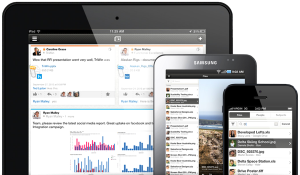A friend of mine recently enabled her “Out of the office” automatic email response to tell coworkers that she wouldn’t be checking her email for a period of time. A common enough occurrence, but it got me thinking — in today’s hyper-connected, ‘always-on’ business environment, is that even necessary anymore? Or is that fleeting disconnection from work more important than ever?
Work never sleeps.
There was a time (at least they tell me) when people worked, literally from 9pm to 5pm — they even made a movie about it. Eight hours a day, forty hours a week and that was it. If you needed someone after five, you had to wait until the next day. Today, things are very different.
Now, we’re working…well, whenever. A survey conducted by iPass in May 2012 found that over 50% of those polled sent emails before work, almost 75% sent emails after leaving for home, 9% said they sent emails around the time they put their kids to bed, and 28% send it at their own bedtime. In short, people work when they can.
And now with mobile devices, it’s even easier to always stay in-the-loop. But do we really want to that? Is that a good thing? Let’s have a look at the two sides of the “always-connected” coin:
The cons of constant contact.

There are some valid reasons for rejecting the mobile revolution. A recent Gallop poll says that using mobile technology for work was linked with higher stress.
In addition, almost one out of four Americans sees being constantly connected as a burden. The numbers are a bit lower in other countries, but that’s still a lot of people who don’t like the idea of work extending beyond the office walls and into their personal lives.
This negativity towards technology might stem from a fear that mobile could be causing social problems by distorting normal human interaction and face-to-face communication. Or simply because, as some experts believe, there is a very human need to be out of the office and out of touch.
Regardless of the truth, there will always be people who don’t put as much priority on their work life as they do on their family life.
The pros of constant contact.
Ironically, that same Gallop poll also found that workers who use mobile technology rate their lives better. In fact, despite the very real cons of constant contact, over half of the respondents nonetheless felt that mobile increased their effectiveness (a number that will only increase as the backlash against mobile wanes with successive generations).
That’s because constant contact gives people more flexibility, greater control of their time, and the freedom to get work done whenever or wherever they want. Working outside the office even makes us more creative! At the same time, constant contact helps out companies, too — instant access to employees prevents unnecessary delays and costly work stoppages.
Constant contact contributes to both increased workplace productivity as well as increased employee happiness —it’s the epitome of “win-win.”
But it’s not enough just to give employees email access on their mobile devices. Asking people to do work on their own personal time is bad enough, but asking them to deal with all of email’s hassles only makes it worse.
Why email isn’t the “always on” answer.
Writing and responding to emails, whether on mobile or desktop, is a huge time-waster. In fact, Andrew Killick of Modeuro Consulting thinks 40% of an employee’s time is wasted dealing with internal emails that have no business value. He also believes that most companies could realize 5%-30% more productivity by cutting back on email. And that’s just in the sender’s and recipient’s time — as we said in a previous post, email kills the productivity of other employees, too (and not in the way you think).
So if email doesn’t make the most of employee’s valuable out-of-the-office time, what does?
Take actions with tibbr Mobile.
 The key to balancing the pros and cons of constant contact is using the right system. tibbr was designed from the ground up to do the things business people need to do — to communicate, collaborate, ideate, view files, share files, integrate business apps, and more.
The key to balancing the pros and cons of constant contact is using the right system. tibbr was designed from the ground up to do the things business people need to do — to communicate, collaborate, ideate, view files, share files, integrate business apps, and more.
As history has repeatedly taught us, nothing reduces workplace productivity more than bad tools. That’s why our award-winning tibbr Mobile app does it all in a simple, easy-to-use interface so people get get work done quickly and get back to being out of touch.
Email doesn’t let people do any actual work — sure, you can TELL someone to do something, but you can’t actually DO anything through email. The tibbr Mobile app lets employees directly approve or deny things in other apps like POs, expense reports, or vacation time (even inside third-party business apps).
By simplifying, reducing and focusing work to a single pane of glass, tibbr Mobile is the only thing people need to check when they’re out of the office — compared to email, tibbr’s a far more effective way to work.
To learn how tibbr’s Mobile app can help employees stay connected and be more productive, get a free trial of the tibbr platform now.






